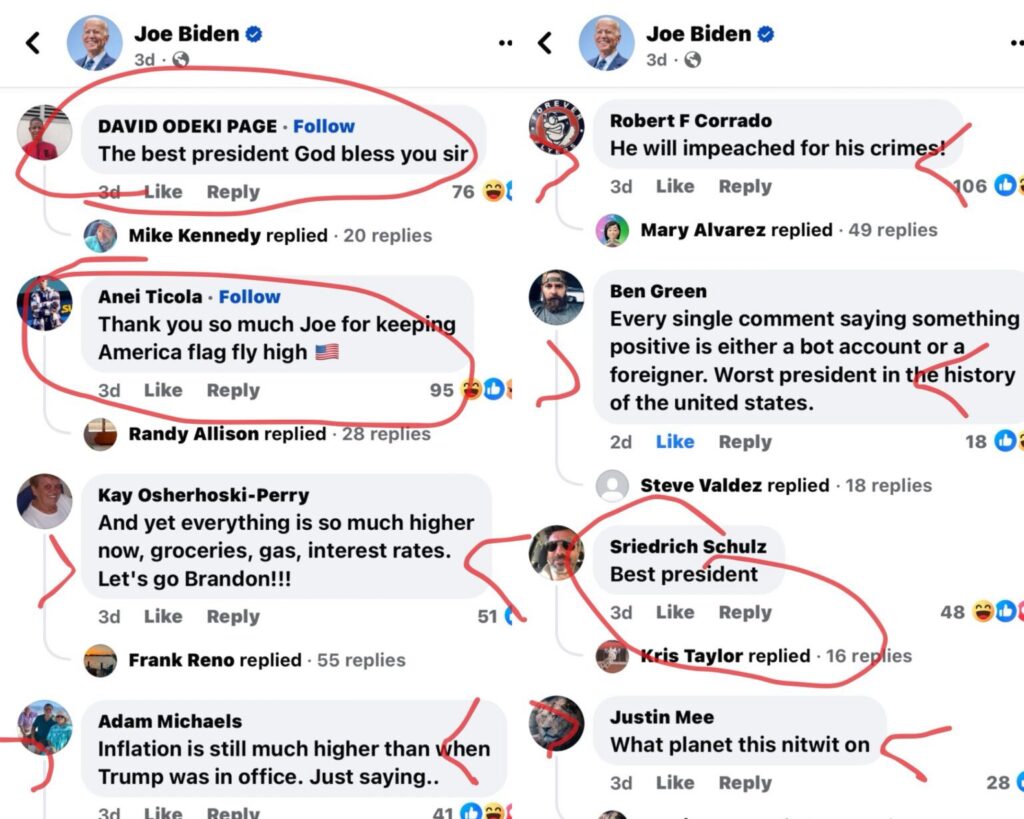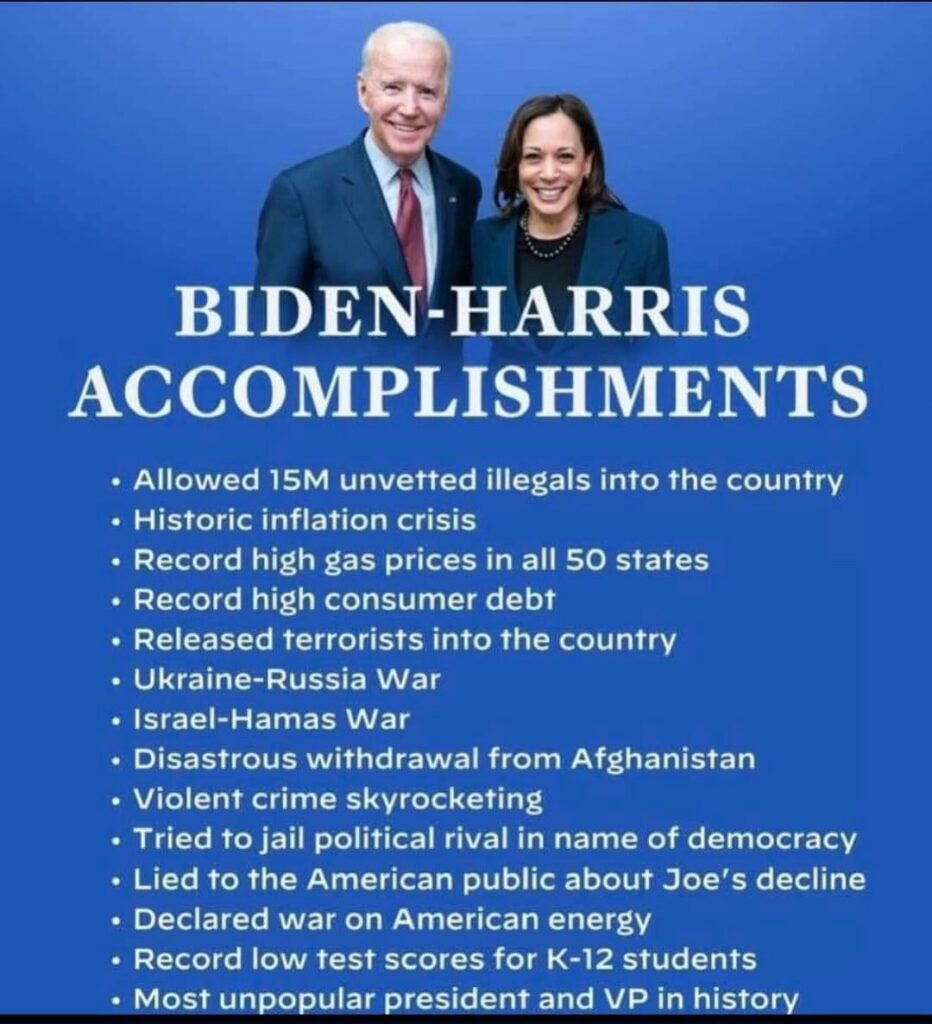Kamala Harris has climbed the political ladder from District Attorney to U.S. Senator, and now, Vice President of the United States. However, her potential ascent to the presidency raises significant concerns among many Americans. Critics argue that her leadership could be detrimental to the country on multiple fronts, from foreign policy to economic impact and ethical considerations. This article explores why Kamala Harris might be a disaster for America, highlighting key issues and concerns that voters should consider.

Economic Impact Of Kamala Harris
The economic policies championed by Kamala Harris during her tenure as Vice President have raised alarm among many who compare them unfavorably to those under the Trump administration. Critics argue that her economic stance is detrimental to American workers and overall economic growth.

Wage Growth Under Trump vs. Harris-Biden Administration During the Trump administration, wage growth after inflation was notably higher. This period saw significant economic expansion, tax cuts, and deregulation, which proponents argue led to increased take-home pay for many Americans. In contrast, the Harris-Biden administration has faced criticism for its handling of the economy, particularly regarding wage stagnation and rising inflation. Critics claim that the policies implemented under their watch have not effectively addressed the economic challenges facing American workers.
Analysis of Kamala Harris’s Economic Policies Kamala Harris has supported several economic initiatives that have sparked controversy. The Inflation “Reduction” Act, for instance, has been criticized for its failure to deliver tangible economic benefits. Many argue that the act has not only been ineffective in curbing inflation but has also placed additional burdens on taxpayers without providing the promised relief. This stance is seen as part of a broader pattern of economic policies that prioritize progressive agendas over practical solutions.

How Kamala Harris’s Policies Are Perceived to Harm American Workers The economic policies associated with Kamala Harris and the broader Biden administration are perceived by many to be harmful to American workers. Critics argue that the focus on expansive social programs and regulatory increases has stifled economic growth and job creation. The emphasis on redistributive policies, they claim, has failed to foster a robust, competitive economy that benefits all citizens.
For a detailed analysis of how political figures leverage social media, consider reading about Joe Biden’s Fishy Facebook Account. Understanding these dynamics can provide insight into how economic narratives are shaped and disseminated.
In summary, the economic impact of Kamala Harris’s policies is a major concern for many Americans. Comparisons to the Trump administration highlight significant differences in approach and outcomes, with critics arguing that Harris’s policies have not effectively supported wage growth or economic stability for American workers.

Support for Controversial Policies
Kamala Harris’s support for several controversial policies during her tenure as Vice President has drawn significant criticism. These policies, implemented under the Harris-Biden administration, have raised concerns about their effectiveness and the broader impact on the nation.
Click here to—->>> to see why the Biden – Harris admin as failed America
Support for Biden’s Policies: Open Borders, Afghanistan Withdrawal, and Ukraine Kamala Harris has been a vocal supporter of several high-profile policies that have faced substantial backlash. One of the most contentious issues is the administration’s approach to immigration. Critics argue that the policy of open borders has led to increased illegal immigration, straining resources and creating security concerns. Harris’s role in the botched Afghanistan withdrawal has also been heavily criticized. The chaotic exit not only resulted in the loss of American and Afghan lives but also damaged the U.S.’s credibility on the global stage. Furthermore, the administration’s handling of the Ukraine crisis has been seen as inconsistent and ineffective, raising questions about its foreign policy strategies.

The Inflation “Reduction” Act and Its Failures The Inflation “Reduction” Act, championed by the Harris-Biden administration, was intended to address rising inflation and provide economic relief. However, many argue that the act has failed to achieve its goals. Instead of reducing inflation, critics claim it has led to increased government spending and higher taxes, placing additional financial burdens on American families without delivering the promised economic benefits.
Harris’s Role in the Biden Administration and Her Lack of Major Responsibilities Despite being Vice President, Kamala Harris has often been sidelined in significant policy decisions. President Biden entrusted her with limited major responsibilities, one of the most notable being the border crisis. Under her oversight, the situation has worsened, further fueling criticism of her leadership capabilities. If President Biden did not trust Kamala Harris with substantial responsibilities, it raises the question of why the American public should trust her with higher office.

For a deeper understanding of how social media plays a role in political perceptions, you can explore Joe Biden’s Fishy Facebook Account.
In summary, Kamala Harris’s support for controversial policies, coupled with her limited responsibilities in the administration, raises significant concerns about her effectiveness as a leader. These issues highlight the potential risks of her holding a higher office, particularly in terms of policy implementation and national security.

Immigration Policies
Kamala Harris’s stance on immigration has been one of the most contentious aspects of her political career. Her support for policies that critics argue exacerbate the issue of illegal immigration has significant implications for American society and economy.
Kamala Harris’s Stance on Free Healthcare for Illegal Immigrants In 2019, Kamala Harris publicly called for illegal immigrants to receive free healthcare paid for by American taxpayers. This position has been heavily criticized, with opponents arguing that it places an undue burden on the healthcare system and taxpayers. Providing free healthcare to illegal immigrants is seen by many as an incentive for further illegal immigration, which can strain public services and resources. About the only thing we can agree with Kamala on is that cannabis should be legal nationwide, it’s not dangerous and should be supervised and allowed to be bought safely by adults.

Impact of Illegal Immigration on Black and Indigenous Families Illegal immigration has been argued to have a disproportionate impact on Black and Indigenous families. These communities often compete with illegal immigrants for low-wage jobs, which can drive down wages and make employment more difficult to obtain. Additionally, increased competition for housing and public services can exacerbate economic and social inequalities. Critics claim that Kamala Harris’s immigration policies, including her stance on free healthcare for illegal immigrants, fail to address these concerns and instead contribute to greater inequality and hardship for marginalized communities.
Economic and Social Consequences of Kamala Harris’s Immigration Policies The economic and social consequences of Kamala Harris’s immigration policies are significant. By advocating for more lenient immigration policies and increased benefits for illegal immigrants, critics argue that Harris’s approach undermines the rule of law and incentivizes illegal immigration. This can lead to increased costs for taxpayers, greater competition for jobs and housing, and heightened social tensions. Furthermore, such policies can strain public resources, including healthcare and education systems, making it more challenging to provide quality services to all residents.
For a contrasting approach to immigration, consider reading about Donald Trump’s Deportation Policies. Trump’s policies focused on stricter immigration enforcement and reducing the number of illegal immigrants in the country, which supporters argue helped protect American jobs and reduce public spending on services for non-citizens.
In summary, Kamala Harris’s immigration policies, particularly her support for providing free healthcare to illegal immigrants, are seen by many as harmful to American society and economy. The impact on marginalized communities and the broader economic and social consequences highlight significant concerns about her approach to immigration and its potential effects on the nation.

Legal and Ethical Concerns
Kamala Harris’s career has been marked by several legal and ethical controversies that raise significant questions about her integrity and suitability for higher office. These concerns highlight her inconsistencies and the potential conflicts of interest that have defined her political journey.
Kamala Harris’s Record on Marijuana Legalization vs. Personal Use As a prosecutor, Kamala Harris played a role in incarcerating numerous individuals for marijuana-related offenses. According to reports, she prosecuted over 1,500 people for marijuana violations. This tough-on-crime stance contrasts starkly with her later admissions of personal marijuana use, which she has joked about publicly. This apparent hypocrisy has drawn criticism from both sides of the political spectrum, painting her as a leader who enforces laws on others while exempting herself from the same standards. For more on this, see this analysis by The Federalist.
Kamala Harris’s Actions to Conceal Biden’s Health Issues Kamala Harris has been accused of helping to hide President Biden’s health issues from the public. Critics argue that this lack of transparency is a disservice to the American people and raises questions about her willingness to prioritize political loyalty over public accountability. This issue underscores broader concerns about her alignment with the Washington elite rather than the interests of everyday Americans.
Analysis of Kamala Harris’s Career as a Lawyer and Associated Controversies Kamala Harris’s career as a lawyer has been riddled with controversies. During her time as California’s Attorney General, she was criticized for her handling of wrongful convictions and her opposition to criminal justice reforms. Furthermore, Harris’s significant campaign contributions from the legal industry have fueled suspicions about potential conflicts of interest. As noted in this OpenSecrets report, lawyers were the largest contributors to her 2020 primary campaign, leading to concerns about her ties to the legal profession and the potential influence of these contributions on her policy decisions.
We must remember, Kamala is from California and worked for years in California government, why the hell would we want her as president?

In summary, Kamala Harris’s legal and ethical record raises several red flags about her suitability for higher office. Her history of prosecutorial decisions, personal conduct, and potential conflicts of interest suggest a leader who may not always act in the best interests of the American people. These concerns are critical for voters to consider when evaluating her candidacy.

Public Perception and Staff Turnover
Kamala Harris’s tenure as Vice President has been plagued by high staff turnover and negative public perception, raising significant concerns about her leadership style and effectiveness. These issues highlight potential weaknesses that could impact her ability to lead the nation effectively.
High Turnover Rate Among Kamala Harris’s Staff One of the most telling indicators of Harris’s leadership challenges is the exceptionally high turnover rate among her staff. Reports indicate that 92% of her staff left within her first three years as Vice President. Such a high rate of turnover suggests deep-rooted issues within her office, including potential problems with workplace culture, management practices, and interpersonal relationships. A leader who cannot retain staff may struggle to maintain a cohesive and effective team, which is crucial for any successful administration. For more on this, see this report from The Federalist.
Public and Political Perception of Kamala Harris’s Leadership Kamala Harris’s public approval ratings have been consistently low, with many Americans expressing doubts about her capabilities and leadership qualities. Her performance during the 2020 Democratic primary was underwhelming, as she failed to gain significant support despite being one of the most liberal Senators in America. This poor showing reflects a broader skepticism among voters about her ability to connect with the electorate and effectively communicate her vision.
Kamala Harris’s Performance in Elections and the Democratic Primary Harris’s electoral history reveals a pattern of underperformance even in her home state of California. In statewide elections, she has often received less support than the average Democrat, indicating lukewarm enthusiasm for her candidacy among her constituents. During the 2020 Democratic primary, Harris’s campaign failed to resonate with voters, leading to an early exit from the race. This lack of electoral success raises questions about her ability to galvanize support on a national scale.
Comparison to Trump’s Transparent and Consistent Public Image In contrast to Harris’s struggles with public perception and staff retention, former President Donald Trump has maintained a relatively transparent and consistent public image. Despite his controversial style, Trump is often praised for being direct and straightforward, qualities that many voters find refreshing. Trump’s lengthy career in the public eye, including his successes in real estate, television, and business, provides a stark contrast to Harris’s more limited and less celebrated political career.
To understand more about the influence of media on political figures, explore the political affiliations of Hollywood’s leading actors. This article sheds light on how public figures shape and are shaped by their political stances.
In summary, the high turnover rate among Kamala Harris’s staff and her consistently low public approval ratings are significant concerns for her potential leadership. These issues suggest that Harris may struggle to build and maintain an effective team and connect with voters, both of which are critical for any successful presidency.

Lack of Significant Achievements By Kamala
Kamala Harris’s political career spans nearly two decades, yet her record is often criticized for a lack of significant accomplishments. This perceived deficiency raises questions about her effectiveness and suitability for higher office, especially when contrasted with leaders who have demonstrated tangible successes in various fields.
Kamala Harris’s Track Record in Politics and Governance Despite her long tenure in public service, Kamala Harris has few major achievements to her name. As California’s Attorney General and later as a U.S. Senator, her legislative and policy impacts are seen by many as minimal. Critics argue that her tenure has been marked more by high-profile positions rather than substantive accomplishments that have positively impacted her constituents or the country at large.
Comparison to Trump’s Successes in Various Fields Former President Donald Trump’s career offers a stark contrast to Harris’s political trajectory. Trump’s successes span multiple industries, including real estate, entertainment, and business. His ability to achieve significant milestones in diverse fields is often highlighted by supporters as evidence of his effective leadership and problem-solving skills. Trump’s tenure as President, despite its controversies, included notable achievements such as the tax cuts, the First Step Act, and the Abraham Accords, which are often cited as examples of his impactful governance.
Concerns Over Kamala Harris’s Qualifications and Her Ascent to Vice Presidency Kamala Harris’s rise to the Vice Presidency has been scrutinized for its reliance on identity politics rather than merit. Critics argue that her selection was heavily influenced by her gender and race, as President Biden had pledged to choose a woman of color as his running mate. This approach is viewed by some as prioritizing diversity over qualifications, which they believe could set a concerning precedent for leadership selections based on characteristics other than capability and experience.
The Role of Affirmative Action in Harris’s Career The influence of affirmative action in Kamala Harris’s career is a contentious topic. While her achievements as a woman of color in a predominantly white and male political landscape are notable, there is debate over whether her rise was due to her merit or the result of political expediency. This ongoing discussion underscores broader concerns about the effectiveness and fairness of affirmative action policies in political appointments.
Comparison with Other Leaders Unlike Trump, who had established a well-documented record of success before entering politics, Harris’s pre-political career does not include significant achievements. This comparison further fuels doubts about her capability to handle the responsibilities of higher office.
For insights into the significance of leadership and valor, consider exploring articles like Top 40 Military War Movies: A Tribute to Valor and Sacrifice and Land of the Free Because of the Brave: A Tribute to Courage and Liberty. These pieces highlight the importance of strong leadership and the qualities that define effective leaders.
In summary, the lack of significant achievements in Kamala Harris’s career, coupled with concerns over her qualifications and the role of affirmative action in her rise, presents a critical challenge to her suitability for the presidency. When contrasted with leaders like Trump, who have demonstrated substantial successes, Harris’s record appears insufficient for the demands of the highest office in the nation.

Why Kamala Harris Would Be a Disaster for America
1. Foreign Policy and Leadership Concerns
- Kamala Harris is perceived to lack the toughness and negotiation skills needed to handle formidable global leaders like Vladimir Putin and Xi Jinping. Compared to Trump’s successful and assertive foreign policy record, Harris’s approach raises concerns about America’s international standing and security.
2. Economic Impact
- Under the Harris-Biden administration, wage growth has stagnated, and rising inflation has placed additional burdens on American workers. Harris’s support for policies like the Inflation “Reduction” Act, which has been criticized for failing to deliver promised benefits, is seen as detrimental to the economy.
3. Support for Controversial Policies
- Harris has backed several contentious policies, including open borders, the botched Afghanistan withdrawal, and inconsistent handling of the Ukraine crisis. Her limited responsibilities in the Biden administration, notably her ineffective management of the border crisis, further question her leadership abilities.

4. Immigration Policies
- Harris’s stance on providing free healthcare for illegal immigrants, funded by taxpayers, is viewed as incentivizing illegal immigration and straining public resources. This approach is seen as particularly harmful to Black and Indigenous families who face increased competition for jobs and housing.
5. Legal and Ethical Concerns
- Harris’s record as a prosecutor includes prosecuting over 1,500 people for marijuana-related offenses while admitting to personal use, highlighting a hypocrisy that undermines her credibility. Her role in concealing President Biden’s health issues from the public also raises questions about her integrity and transparency.
6. Public Perception and Staff Turnover
- An exceptionally high staff turnover rate (92%) and consistently low public approval ratings indicate significant issues with Harris’s leadership and management style. Her poor performance in elections, including the 2020 Democratic primary, reflects a broader skepticism about her capabilities.
7. Lack of Significant Achievements
- Despite nearly two decades in politics, Harris has few notable accomplishments. Her rise to the Vice Presidency is often attributed more to identity politics than merit, raising concerns about her qualifications. Compared to Trump’s successes in real estate, entertainment, and business, Harris’s record appears insufficient for the demands of the presidency.
8. Cultural and Social Influence
- Harris’s ties to Hollywood and elite circles, as well as the perception of inauthenticity and overcompensation for anxiety issues, further detract from her public image. Her inability to connect with voters and build a strong, cohesive team underscores her potential weaknesses as a leader.
In conclusion, the combination of foreign policy weaknesses, economic missteps, support for controversial policies, legal and ethical concerns, public perception issues, lack of significant achievements, and cultural disconnection all contribute to the argument that Kamala Harris would be a disaster for America if she were to assume the presidency.
As an Amazon Associate we earn from qualifying purchases through some links in our articles.



